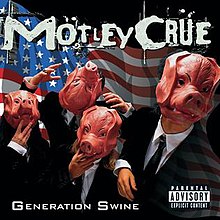Generation Swine
| Generation Swine | ||||
|---|---|---|---|---|
 |
||||
| Studio album by Mötley Crüe | ||||
| Released | June 24, 1997 | |||
| Recorded | 1995-1997 | |||
| Studio | Can-Am Recorders, Tarzana, Music Grinder Studios and Conway Studios, Hollywood, The Enterprise, Burbank, The Chop Shop and Butt Cheese West Studio, Los Angeles, California |
|||
| Genre | Alternative metal | |||
| Length | 64:06 | |||
| Label | Elektra | |||
| Producer | ||||
| Mötley Crüe chronology | ||||
|
||||
| Singles from Generation Swine | ||||
| Professional ratings | |
|---|---|
| Review scores | |
| Source | Rating |
| AllMusic | |
| Chicago Tribune | |
| Collector's Guide to Heavy Metal | 9/10 |
| Entertainment Weekly | (B) |
| Metal Forces | (6/10) |
| Rolling Stone | |
| The Rolling Stone Album Guide | |
| Sputnikmusic | |
Generation Swine is the seventh studio album by the heavy metal band Mötley Crüe, released on June 24, 1997. The album marks the return of lead singer Vince Neil following his last appearance on 1989's Dr. Feelgood and the last to feature drummer Tommy Lee until the 2008 album Saints of Los Angeles.
Following the commercial failure of the band's self-titled album, Mötley Crüe was under pressure by executives at Elektra Records to return Mötley Crüe to the level of commercial success that the band enjoyed in the 1980s.
The band, then officially consisting of vocalist/guitarist John Corabi, bassist Nikki Sixx, drummer Tommy Lee and guitarist Mick Mars, were so frustrated with the failure of the previous album and tour sales that they fired numerous people around the group, including their accountant, manager Doug Thaler, and their producer Bob Rock. The band then hired Allen Kovac as their new manager and started looking for another producer to work with for their next record which was originally titled Personality #9.
After the mass firing, the band was called to a meeting with Warner Bros. CEO Doug Morris to discuss the current state of the band. At the meeting, Morris tried to convince Sixx and Lee to get rid of Corabi, as he wasn't a "star," and reunite with original singer Vince Neil. Sixx and Lee were not interested in the idea of working with Neil again, and insisted on keeping Corabi in the group. With some additional convincing from Elektra CEO Sylvia Rhone, Morris agreed and the band continued with their work.
...
Wikipedia
